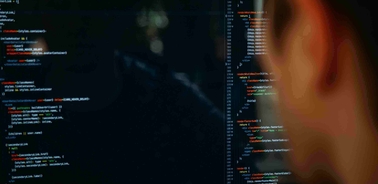- Home
- We Are Law School
- News
- Living With The Algorithm: Students Develop An Innovative Project To Raise Awareness Of New Technologies
Living with the Algorithm: students develop an innovative project to raise awareness of new technologies

A team from IE´s Legal Clinic students took part in the Algorithms Project, a guide which aims to give citizens a broad yet useful understanding of the role of algorithms in our daily lives. Learn more about this invaluable experience.
The IE Legal Clinic aims to provide students with real-world experience through pro bono practice, while making an important contribution to society. Recently, a team of IE Law School students took part in the Algorithms Project, commissioned by the Foro de la Sociedad Civil (a civil society forum), represented by Pablo García Mexía, of Counsel, Ashurst LLP. Under the supervision of faculty supervisor Argyri Panezi, the students of the legal clinic collaborated with the association, resulting in an invaluable learning opportunity—and the chance to make a real impact through their work.
The project had two phases: it started in January 2019 with a larger team that initiated the research: Aurora Dell’Elce Bueno (LLB-IR), Luis Ignacio Gil Palacios (LL.M.), Amanda Matesanz (LLB-IR), Ellie Sande (LLB) and Adam Wilson-Barnes (LLB), Tugce Altunalan (LL.M.) and continued throughout the present academic year with the drafting team: Aurora Dell’Elce (LLB-IR), Jimena López-Navarro (LLB-BBA), and Aleksandra Smajevic (LLB-IR).
A guide to algorithms for everyone
The final outcome of this project was Living with the Algorithm - Toward a New Social Contract in the Age of AI, which aims to give citizens a broad yet useful understanding of the role of algorithms in our daily lives. The guide explains how algorithms work, where they are primarily used and how they impact our jobs, privacy and relationships. It addresses contemporary debates on a variety of topics, and also introduces principles for the good and sustainable use of data.
What are algorithms?
Algorithms are sets of instructions or well-defined rules, used to solve problems and perform calculations. They are used in various sectors to increase efficiency and accuracy, and to enable automated decision-making. They’re also at the center of current discussions about technology, automation and artificial intelligence.
While immensely useful in terms of efficiency, accuracy and speed, algorithms come with certain challenges. Thanks to the velocity of technological innovation, these challenges are not easy to regulate. For example, algorithms can reinforce bias and discrimination that already exist in society, leading to controversy and even injustice. This leads us to the main proposal of the guide: the need for “good” and sustainable data, as further defined in our work.
An example of algorithms gone wrong
In October 2019, Austria’s employment agency, AMS, introduced a sorting algorithm that assigned each job seeker an employability score and placed him or her in a certain category. Based on previous employment records, the algorithm gave women and disabled people lower scores, placing them in lower categories even if they had the same qualifications as men or non-disabled people. Although the algorithm increased efficiency, it was criticized for reinforcing discrimination and failing to reveal the statistical models on which it was based.
In response to cases such as this one, a series of initiatives has been introduced at the national and supranational levels. Their goal is to develop frameworks to keep this from happening again, including principles such as transparency, equality/non-discrimination, accountability and safety.
The project aims to help citizens become more aware of the importance of algorithms in modern society. Living with the Algorithm - Toward a New Social Contract in the Age of AI, is an informative guide, explains how algorithms are used, and details both the opportunities and challenges that they present.
What can we do to address the problems of algorithms?
When wielded correctly, algorithms are a powerful tool that can improve people’s lives and work. The main proposal of the Algorithms Project is based on the need for good and sustainable data. The participation of civil society is critical to ensure that relevant policies will promote legal and ethical standards, while also protecting peoples’ fundamental rights.
With this in mind, the project aims to help citizens become more aware of the importance of algorithms in modern society. Living with the Algorithm - Toward a New Social Contract in the Age of AI, is an informative guide to this subject. It explains how algorithms are used, and details both the opportunities and challenges that they present.
What was it like to take part in this project?
Below, three of the students involved share their experiences with the Algorithms Project. They explain how their participation in the Legal Clinic impacted their lives and professional trajectories, and ultimately became an immensely valuable exercise. Read their stories!
Aurora Dell’Elce Bueno (LLB-IR)

This analysis is essential, on the one hand, to question the existing regulatory mechanisms and their ability to adapt to this new form of intelligence and its multiple applications. On the other hand, it’s also vital to question the relevance of new regulations, allowing AI to develop in an environment that protects individuals. This universal subject merits an interdisciplinary approach, from both a legal and an economic perspective, with input from specialists in computer science, health, humanities and social sciences.
For these reasons, based on a specific request from the Foro de la Sociedad Civil think tank, the Legal Clinic decided to actively contribute to this project. One can only admire IE’s continuous dedication to exploring these uncharted waters, and joining a fairly small group of pioneering stakeholders in this innovative field. There is a lot at stake, so a purely theoretical approach is not enough.
Our task was to popularize this subject, and bring it to a level where everyone could understand it. To do this, we developed a guide that the general public could understand.
The first part of the guide provides a pragmatic definition of algorithms and artificial intelligence. It showcases their main uses, and especially those that attract the most public attention, such as the gig economy and smart contracts. The second part of the guide provides a practical response to the ethical, philosophical, historical and sociological concerns raised by algorithms.
I’m sure you can already see how incredibly interesting this topic is! Since the beginning of our journey (which isn’t over yet), we have been aware of the immense value of this opportunity to contribute to such an important project. In addition, the continuous and unfailing support of our professor throughout the year has been invaluable.
It all started with countless reading and research sessions in order to capture all the subtleties of this new world. The objective was to provide an overview, in order to weigh the possible need for changes, formalized as proposals. Then each student was assigned a specific case study. Mine focused on the use of blockchains in smart contracts and their impact on financial markets. Other case studies related to areas like the gig economy.
Personally, I loved the legal research part of the process, especially regarding a topic that’s constantly growing. These new technologies are promising, but they also raise multiple concerns related to the determination of AI’s legal nature. It’s up to the law to define its outline and issues (such as the GDPR, data protection and the certification of algorithms), and to understand its ethical consequences.
That being said, the project was an incredible opportunity for collaborative work on a very interesting subject with other students in Madrid. We shared direct exposure to a client and a common goal: to successfully meet the challenge of satisfying a real request.
Moreover, this journey has boosted my interest in innovative projects like this one—not only from a personal perspective, but also in terms of academic development. Besides, we all know that teamwork allows you to acquire knowledge in a fun way. And believe me, the direct contact with a client—in our case a think tank—was just icing on the cake!
This project enhanced our knowledge and experience while we pursued a university degree. Simply put, we were able to implement the lessons learned in our law classes almost immediately, enhancing customer interaction and facilitating our ability to perform the required tasks.
Ultimately, this Legal Clinic lab was an incredible opportunity for me to gain an experience like no other: a stimulating journey and a preview of work to come. As I said before, the subject immediately caught my attention. I am convinced that adequate public information will contribute to raising awareness among future generations, architects and users of these new technologies. This is fundamental to ensuring inclusion, diversity and the interdisciplinary mix that AI requires.
From a legal perspective, the practicality of these innovative technologies must continue to be explored. Framing their economic, social and political effects will undoubtedly be one of the most important projects of the years to come.
Aleksandra Smajevic (LLB-IR)
“I have a newfound awareness of the speed and extent to which algorithms, and technology in general, are changing our everyday lives.”
I had a wonderful experience with IE’s Legal Clinic. Most first-year undergraduate students don’t have the chance to work with law firms—let alone in a way that allows them to learn so much and get hands-on practice dealing with legal documents. My Legal Clinic projects gave me both of these things.
I first worked with DA Lawyers, a Spanish law firm based in Madrid, to serve our client, Kimple, an NGO that gives students the education they need to become 21st-century citizens. We helped provide Kimple with the appropriate intellectual property (IP) templates that they’ll need when using educational material from other companies.
Through this experience I was introduced to the most important concepts of intellectual property law. I also became familiar with the basic structure of contracts, and had the chance to read and edit contractual agreements. Finally, I got the opportunity to see what it’s like to meet with clients and respond to their needs. I really felt that I was part of a law firm.
After working with DA Lawyers, I joined the Algorithms Project. It was a very enriching experience for me in many ways. Before this, I had no knowledge of what algorithms were, how they’re used or their impact on social institutions. Since I started working on the project, I’ve gained an understanding of the digital era. I now know the benefits of algorithms and AI for various sectors, but also the challenges they pose. Most importantly, I will continue to keep these challenges in mind as I progress through my legal studies.
My biggest takeaway from this project is my own learning experience. I contributed to the project by reading and writing about the gig economy, online platforms and EU law; I focused on the General Data Protection Regulation (GDPR). This gave me insight into interesting case studies and specific branches of law before we covered them in class.
Last but not least, this project has also given me experience working in a large team and on a long-term academic project. I’ve gained interpersonal skills by communicating and collaborating with a wide group of people, and have learned how to work with large academic texts.
Overall, it was incredibly fulfilling to be able to see a project I’m a part of grow and develop over time. I had never had the chance before to dive so deeply into a certain topic that interests me, and to explore it from so many angles. It’s very enriching to feel that I’ve gained significant knowledge and understanding of a certain subject—especially when it’s so relevant and topical.
Jimena López-Navarro (LLB-BBA)

The Legal Clinic was definitely a unique and rewarding experience. I worked alongside Aleksandra on our first project for Kimple, which introduced me to contract law and intellectual property law. We had the privilege of meeting and working alongside our client throughout the project. I almost felt like I was a lawyer! After this, we also worked together on the Algorithms Project.
With both projects, it was made clear from the beginning that we had been given a great responsibility to carry out valuable work, which was an immense honor. However, this second project revealed an uncomfortable truth. I certainly knew a lot less about technology than I thought I did! And unfortunately, I’m probably not the only one in this situation, which is why so many people can benefit from reading the guide we developed.
I was assigned to write about “good data.” This refers to collecting data in an ethical manner, in an age when governments and corporations are gathering massive amounts of citizens’ data using increasingly questionable methods. The principles of good data aim to protect citizens by ensuring that companies cannot take advantage of their lack of knowledge about algorithms and how they process their data (for example, how it’s collected, for what purpose, under what conditions and for how long).
This project has been rewarding in many ways, including helping me improve my research and teamwork skills. While it was initially challenging, I learned how to work independently on a large and long-term academic paper. All in all, it was a great opportunity to have the Legal Clinic as our first work experience, especially because we were treated like lawyers from the beginning!
A word from the faculty: Argyri Panezi
Working with the IE Law student teams in the Legal Clinic is a privilege and a responsibility. At IE, we have the good fortune of working with students of diverse backgrounds and interests, who are usually enrolled in the LL.B. and dual degrees. This multilingual and multidisciplinary pool of students brings extraordinary skills to the table. They easily become familiar with multiple jurisdictions and engage in global debates, analyzing laws and policies that are relevant in local, national and global contexts.
The Algorithms Project is a great example of a globally oriented, multidisciplinary project that helped our students take part in a critical and contemporary discussion on technology. It allowed them to work with a Spanish civil society organization to write a guide addressed to citizens within and beyond Spain. We are incredibly proud of the students’ work! We will continue to learn alongside them and witness their growth as they engage with the world beyond IE.
Living with the Algorithm - Toward a New Social Contract in the Age of AI is available here
The Legal Clinic Faculty team:
Argyri Panezi, faculty supervisor for the project, on behalf of the Legal Clinic faculty team:
Francisco de Elizalde, Professor of Private Law, Director of the Legal Clinic
Sara Sánchez, Assistant Professor of Commercial Law, Director of the Legal Clinic
Michail Risvas, Assistant Professor of International Law
[1] Kayser-Bril Nicolas, “Austria’s employment agency rolls out discriminatory algorithm, sees no problem”, Algorithm Watch, 11 October 2019. https://algorithmwatch.org/en/story/austrias-employment-agency-ams-rolls-out-discriminatory-algorithm/
